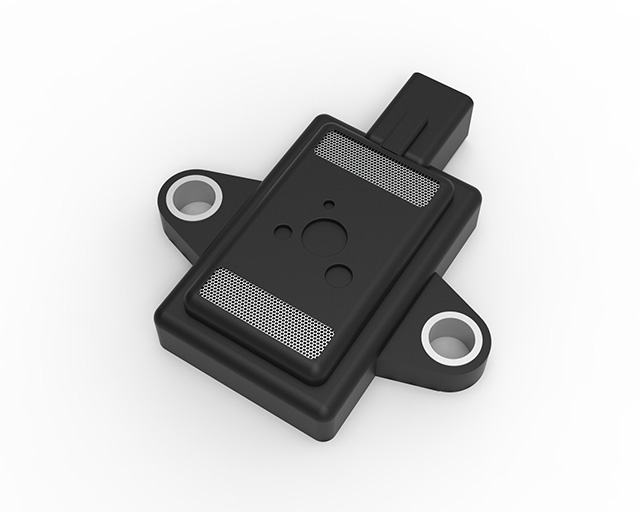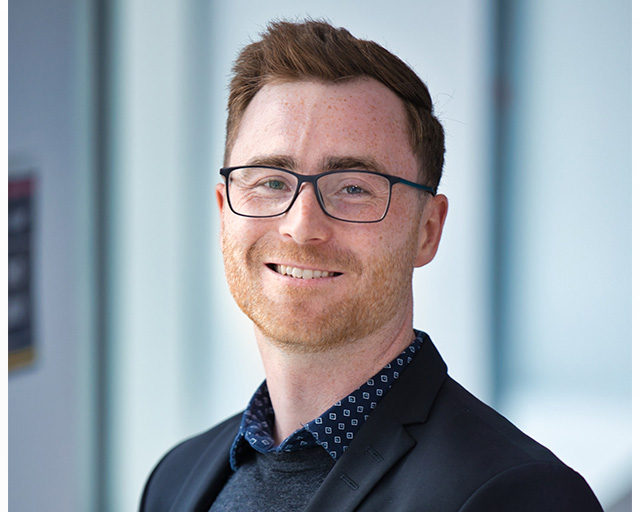A look behind the scenes of the spin-off “Integrative Nanotech“
Integrative Nanotech, a dynamic spin-off from the renowned Fraunhofer Institute for Surface Engineering and Thin Films IST, has joined forces with its parent institution to revolutionize hydrogen leak detection. This strategic partnership will significantly accelerate the development of next-generation hydrogen leak detection systems and prove their production methods on industrial-scale production systems. In this interview, Dr. Hunter King talks about the path to the spin-off, the unique selling points of Integrative Nanotech and the collaboration with Fraunhofer IST.
Dear Hunter, you previously worked at the Fraunhofer IST. What prompted you to set up the spin-off? Who was involved? What challenges did you face along the way and how did you solve them?
The spin-off idea was actually due to an accidental discovery during some unrelated work at Fraunhofer IST. While working towards developing materials for MEMS sensor applications, we accidentally discovered a novel method for producing nanostructured silicon materials at a large scale, with superior properties to what existed in the market. While the technology was very interesting, we had originally put it to the side as we were focused on other project objectives. However, we came back to this material a year or so after the initial discovery, as I started to have ideas for where it could provide a significant competitive advantage in a number of commercial markets. As my background and passion is for sensing applications, I naturally gravitated towards these markets, as I believe being personally invested and interested in the technology is nearly as important as market potential (if you’re going to spend years still further developing and marketing the technology). Once I had decided on a general market direction and discovered some of the competitive advantages of our technology, then I decided to found the company.
Initially I was the sole founder, however Volker Sittinger, and Tino Harig have been consistently involved in parallel on IST’s side since the beginnings. They (and the IST in general) have been incredibly supportive, especially during the very early developmental stages of our company. The early stages also came with a few difficulties, such as securing early-stage funds to go from idea to early proof-of-concept.
Thankfully our company has received a significant show of support from both local and federal governmental agencies due to our strong alignment with their goals for decarbonization, supporting the hydrogen industry, and strengthening existing international bonds between Canada and German.
Integrative Nanotech - What's behind the name? What exactly do you do? What products / services do you offer? Who is involved in the company?
The name is a direct reference to our proprietary technology which gives us our competitive advantage, that is, nanotechnology which can be integrated into large-scale industry due to our commercial-scale manufacturing processes. This enables larger production volumes, and lower production costs than traditional nanomaterial production methods.
We are then building upon this technology to develop the next generation of gas sensing technologies, providing higher performance than what can currently be achieved in the market, and at a competitive price point. Our first product which we are working to bring to market is a high-performance hydrogen sensor for leak detection systems (with a specific focus on the hydrogen-powered transportation sectors). Our technology shows improved detection limits and response times compared with our competitors, and also has a few other advantages (such as the ability to sense under non-atmospheric conditions, without the need of oxygen). We are nearing pilot stage for this technology, and now looking for customers who are interested in helping refine our product to address their needs. Our company currently consists of mainly technical personnel with a complimentary team of engineers, chemists, physicists, and computer scientists. We will be looking to expand this team over the following months, especially as we roll out pilot testing.

What are the unique selling points of Integrative Nanotech?
Integrative Nanotech has multiple unique selling points. The nature of our proprietary technology has several advantages as we can quickly functionalize the nanomaterials to sense a large number of different gases. This has applications not only in leak detection sectors (H2, NH3, etc.), but also in applications such as environmental monitoring (CH4, etc.). Our team’s expertise, coupled with our cutting-edge technology, allows us to deliver tailored advantages to customers in diverse sectors.
What are the (long-term) goals of Integrative Nanotech?
The long-term goal of Integrative Nanotech is quite simple: we want to bring nanomaterials out of the lab, and into the global marketplace, and in doing so, revolutionize the sensing industry.
What role does the IST currently play and will play in the future? What does the future collaboration between Integrative Nanotech and Fraunhofer / the Fraunhofer IST look like?
The IST plays a significant role in our development. Fraunhofer IST acts as our exclusive R&D partner in the development of our first product, which currently includes overseeing the production and development of the materials in our sensor element, which we in turn further characterize in application-specific testing. We see this relationship evolving to include the production of our sensor elements for our prototype stage, eventually leading to our first product in the market. Following this, we will leverage IST’s expertise in system and production upscaling in order to develop an in-house production line for our product. As we grow and move into additional markets, we see Fraunhofer IST playing a key role by allowing accelerated product development through their extensive expertise and technologies.
About Dr. Hunter King
Dr. Hunter King is the founder and CEO of Integrative Nanotech. He holds degrees in mechanical engineering from Dalhousie University where he worked on lab-on-chip MEMS-based sensor platforms. Following his work at Dalhousie he moved to Germany in 2016 to continue his work focusing on materials development for sensing applications. He worked as a project lead at Fraunhofer IST developing silicon materials for MEMS and sensing applications. Dr. King has extensive experience in system development, process simulation and digitization, and AI-based data analytics. After completing his PhD from Technische Universität Braunschweig, he continued as head of sensor development in the CVD group at Fraunhofer IST before founding Integrative Nanotech in 2022.
Last modified:
